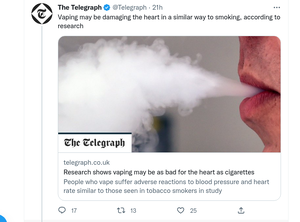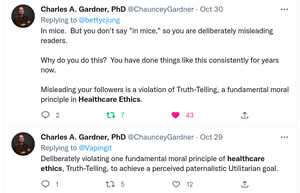Information manipulation
Information Manipulation/Misrepresentation
When THR is reported in the media, manipulation techniques are sometimes employed. The press may, or may not be aware that this is happening, but often the attempt is quite transparent, and the research required to prove it, so trivial, it is hard to argue they are not complicit.
Here are ways to spot this, including the less obvious omissions and questionable use of language.
Creative use of language

For example the word may is doing all the work here, when we read the article, and the study it reports on, we find that short term changes in heart rate and blood pressure where detected, however nothing harmful or long term. Such things as drinking a cup of coffee, running for a bus, or a surprise gift, all cause similar changes.
Such tactics can be argued to go against principles of 'good ethics' particularly where (public) health is concerned, and where not likely to be obvious, context (as provided above with coffee etc.) should be provided. This is not unreasonable, the public expects high standards, when reading about things that are used to make health choices. Please see the next picture particularly the second tweet pictured, regarding the reasons for being untruthful, and why that isn't ok.

Many media reports, and even press releases seem to use the tactic pictured in the image, failing to mention that the results are from a study in mice.
Clearly the public should not be confused in this way, particularly if no evidence has been found for these results to reflect what happens in humans. Omission of information that is required to make an informed decision, particularly if the public can't reasonably expected to deduce or know, is a violation of ethics.
Dr Gardner Has a PHD in developmental neurobiology, and has taught healthcare ethics.
Warning: Contentious subject, please would Page Authors take care to remain factual and include evidence/examples.